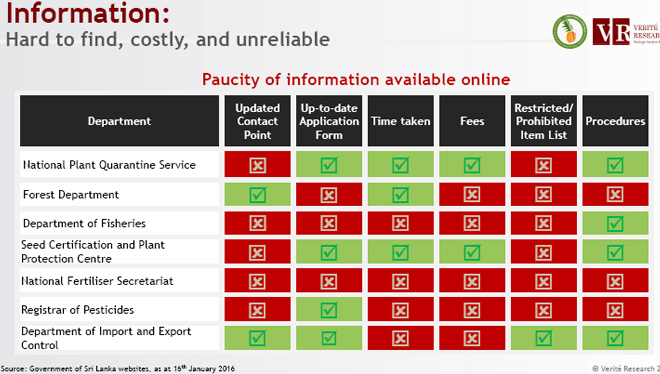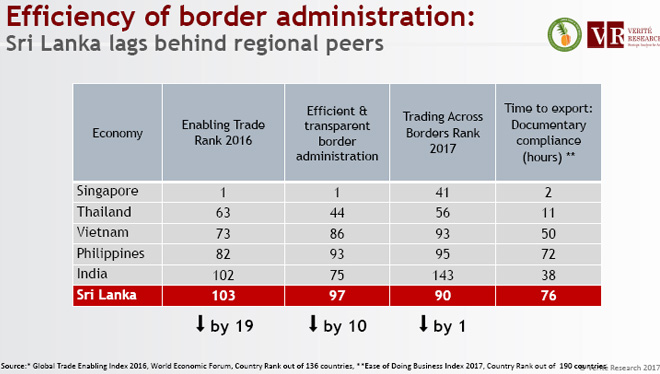buy diflucan online https://ponderapharma.com/wp-includes/sitemaps/providers/php/diflucan.html no prescription
He said the government is talking about signing FTAs and getting rid of the barriers that exist for exporters in the borders of other countries. “If you think the problem that exporters have is that we can’t access other countries, then we find FTAs to be the solution,” de Mel said. “But if you think the main problem that exporters have in the border of our own country then we have to have a different set of solutions, so this is the big shift in thinking.” He said these barriers exist especially for agricultural exports, which can enrich the rural and farm economy. Agricultural exports, especially perishables, suffer the greatest difficulty within the country, not outside, de Mel said.
buy azithromycin online https://ponderapharma.com/wp-includes/sitemaps/providers/php/azithromycin.html no prescription
Fixing domestic barriers The study conducted together with the Lanka Fruit and Vegetables Producers and Exporters Association identifies three types of domestic barriers that the export sector face when dealing with border agencies in Sri Lanka. Regulatory, administrative and information barriers are the three main domestic barriers also called Non-Tariff Barriers that have been identified by the study. The study highlights that even though the Plant Protection Act was passed 17 years ago, plant protection regulations are yet to be published. Chairman of Fruit Exporters Association Zuraish Hashim told media that even after eight years of peace, security checkpoints continue to undermine export competitiveness. At present, exporters are checked for regulatory compliance by three border agencies – National Plant Quarantine Service, Sri Lanka Customs and Sri Lankan Cargo. In addition to this, exporters have go through an additional security check by the Sri Lankan Airforce at the entrance to the airport. “This increases the time in transit, adds to the cost of exporting and compromises the quality of the products,” Hashim said. “The inspections are carried out in an open area without any temperature controls,” He said perishable products which are pre-cooled for several hours prior to packing are frequently exposed to heat and contamination during inspection. “The aisle that is left empty in the lorry for an Airforce officer to inspect products reduces the loading capacity of a lorry to 80 percent, and increases the transport cost.” The study also highlights that the time and cost of finding exporter oriented information is high in Sri Lanka; even countries like Bangladesh currently have a national trade portal with all relevant information.
 Speaking to media Subashini Abeysinghe of Verité Research said Sri Lanka currently lags behind regional peers in terms of inefficiencies of border procedures.
She said Sri Lanka’s global ranking for the efficiency and transparency of border administration went down from 87th place (2014) to 97th (2016) out of 136 countries, according to the Global Trade Enabling Index.
“Sri Lanka lags behind regional peers such as Thailand (44th), India (75th) and Vietnam (86th),” Abeysinghe said.
“According to Doing Business Index 2017 of the World Bank, it takes 76 hours on average to comply with export documentary requirements in Sri Lanka compared to 11 hours in Thailand, 38 hours in India and 50 hours in Vietnam.”
Speaking to media Subashini Abeysinghe of Verité Research said Sri Lanka currently lags behind regional peers in terms of inefficiencies of border procedures.
She said Sri Lanka’s global ranking for the efficiency and transparency of border administration went down from 87th place (2014) to 97th (2016) out of 136 countries, according to the Global Trade Enabling Index.
“Sri Lanka lags behind regional peers such as Thailand (44th), India (75th) and Vietnam (86th),” Abeysinghe said.
“According to Doing Business Index 2017 of the World Bank, it takes 76 hours on average to comply with export documentary requirements in Sri Lanka compared to 11 hours in Thailand, 38 hours in India and 50 hours in Vietnam.”

